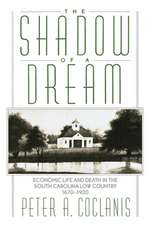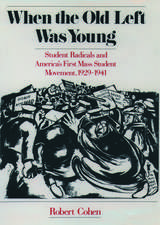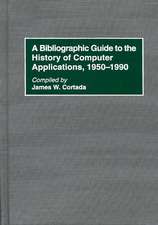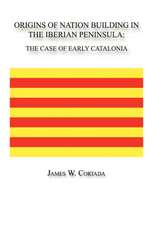All the Facts: A History of Information in the United States since 1870
Autor James W. Cortadaen Limba Engleză Hardback – 5 mai 2016
Preț: 768.98 lei
Preț vechi: 1097.52 lei
-30% Nou
Puncte Express: 1153
Preț estimativ în valută:
147.16€ • 159.80$ • 123.62£
147.16€ • 159.80$ • 123.62£
Carte tipărită la comandă
Livrare economică 11-17 aprilie
Preluare comenzi: 021 569.72.76
Specificații
ISBN-13: 9780190460679
ISBN-10: 0190460679
Pagini: 656
Dimensiuni: 236 x 157 x 41 mm
Greutate: 1.07 kg
Editura: Oxford University Press
Colecția OUP USA
Locul publicării:New York, United States
ISBN-10: 0190460679
Pagini: 656
Dimensiuni: 236 x 157 x 41 mm
Greutate: 1.07 kg
Editura: Oxford University Press
Colecția OUP USA
Locul publicării:New York, United States
Recenzii
[Cortada's] singular contribution will enrich historical and contemporary discussions around the pesky notion of 'facts' in American life.
In exploring the variety of democratic forms that arose in the Atlantic world, Kloppenberg reminds readers that popular self-government was not preordained by modernity nor brought into the world at a single heroic moment.
[W]ell organized and often insightful. Sections about office work, industrial research, management, computing, and the internet display his prodigious knowledge.... All the Facts offers an expansive account of institutional and technological change
James Cortada's magisterial history of information is the single most important book ever published on this fascinating and essential topic. Nothing else has even come close. Covering the period from 1870 to the present and totaling over 600 pages, Cortada has provided historians of information -- in all its guises -- with a deeply erudite tour of the remarkably complex landscape that characterizes how Americans have used information to work, to play, and to earn a living over the past nearly 150 years ... This is an exceedingly important bookCortada has wrought an incredible feat ... It is a seminal work by an established and well-regarded historian and will stand for years as the most comprehensive treatment of the history of information in America in the years since the Civil War.
James W. Cortada has broken new ground in his most recent book dealing with the history of information in the United States since 1870. Cortada advances a new and intriguing scholarly perspective that emphasizes the analysis of the critical role of information in the form of facts and data in shaping social dynamics ... Ultimately, Cortada's new historiography not only creates a means for assessing how informational factors tie the past to the present, but also adumbrates the probable direction of future change.
Cortada does not disappoint when it comes to breadth ... His book serves as a fascinating, exhaustive, and wide-ranging introduction to the concept of information. He made me think, and he has laid bare some fertile soil for future researchers to exploit.
In exploring the variety of democratic forms that arose in the Atlantic world, Kloppenberg reminds readers that popular self-government was not preordained by modernity nor brought into the world at a single heroic moment.
[W]ell organized and often insightful. Sections about office work, industrial research, management, computing, and the internet display his prodigious knowledge.... All the Facts offers an expansive account of institutional and technological change
James Cortada's magisterial history of information is the single most important book ever published on this fascinating and essential topic. Nothing else has even come close. Covering the period from 1870 to the present and totaling over 600 pages, Cortada has provided historians of information -- in all its guises -- with a deeply erudite tour of the remarkably complex landscape that characterizes how Americans have used information to work, to play, and to earn a living over the past nearly 150 years ... This is an exceedingly important bookCortada has wrought an incredible feat ... It is a seminal work by an established and well-regarded historian and will stand for years as the most comprehensive treatment of the history of information in America in the years since the Civil War.
James W. Cortada has broken new ground in his most recent book dealing with the history of information in the United States since 1870. Cortada advances a new and intriguing scholarly perspective that emphasizes the analysis of the critical role of information in the form of facts and data in shaping social dynamics ... Ultimately, Cortada's new historiography not only creates a means for assessing how informational factors tie the past to the present, but also adumbrates the probable direction of future change.
Cortada does not disappoint when it comes to breadth ... His book serves as a fascinating, exhaustive, and wide-ranging introduction to the concept of information. He made me think, and he has laid bare some fertile soil for future researchers to exploit.
Notă biografică
James W. Cortada is the author of over two-dozen books on the history and use of information and computing in American society. His most recent book on the history of information is The Digital Flood: The Diffusion of Information Technology Across the U.S., Europe, and Asia (Oxford, 2012). He is a Senior Research Fellow at the Charles Babbage Institute, University of Minnesota.


























